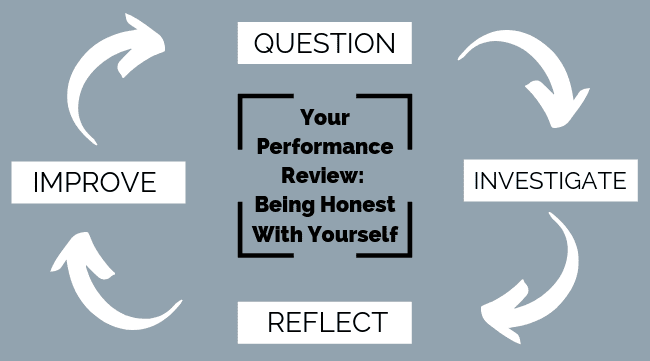
Don’t let the performance review become a dreaded experience, instead adjust your thinking a little and consider this an opportunity to honestly reflect on your work. What does this reflection look like? Likely, it will be slightly different for each person but generally speaking, anybody can follow this easy self-evaluation process that involves an ongoing cycle of inquiry and reflection.
Let’s walk through what this 1four-step cycle looks like as you prepare for your performance review with confidence.
1) Question: What have been your recent accomplishments?
Start by making a list of what you consider to be your work accomplishments over the past year. The big achievements will likely come to mind first such as the implementation of a successful project meeting, a presentation, or a report being completed (on time, or even better ahead of time).
If applicable, this is also the time to revisit your performance review notes from the previous year. This year’s accomplishments may have similarities, but more importantly, you should focus on what both you and your supervisor listed as areas for improvement (more on this in step 3), so that you can also address this in your performance review.
2) Investigate: What data do you have to support your accomplishments?
Looking at your list of accomplishments, be sure to recognize the hard work you put in each day ensuring deadlines were met and goals were achieved. Think about what was required of you each day that allowed you to meet these accomplishments. For example, maybe it was your ability to prioritize work because “new priorities” always pop up unexpectedly or your ability to take on additional work to make sure a project was completed, or possibly it was working as a team-player or working longer hours. Determine whatever it was that made your success a success. Take note of all those supporting efforts as we move into the next step in this cycle: reflection.
3) Reflect: Let’s be honest, there’s always room for improvement
You’ve identified your accomplishments and all the supporting work that went into them but now it’s time to get honest with yourself. I recently heard the term “understrength” for the first time as an alternative to speaking about one’s weaknesses and it immediately gave me a different perspective and made me feel more positive about honestly addressing those areas of need. You may have had many achievements this past year, and maybe you had some that were less than great, but think about what could have gone differently. What could you have done differently? In doing so, would there have been a different result? We all have understrength and that’s okay, but acknowledging what these are and making a plan on how to improve upon them is what your next goal should be.
4) Improve: Take action and make changes
We all procrastinate responding to emails or listening to voicemails but changes in those little habits can make a big difference in work productivity. This is the time to make a plan and make changes to your work regiment so that you’re less stressed. In addition, revise a process that you already do to ensure it is streamlined. Set your intentions for the next year and hold yourself accountable for what you say you want to change. Set your goals for what you want to accomplish.
And don’t forget…
Performance Review and Salary
Performance reviews are not only meant to evaluate one’s own work but can also play a role in salary negotiations. For some, employers provide their employees with an annual 2-3% raise, which is based in part on performance reviews. This conversation is the time for you to shine. By having already gone through the four-step self-reflection process, you are in a place to confidently share proof of what you’ve contributed to your organization, team and all your accomplishments. For a little extra confidence booster, read Tips on How to Negotiate Your Salary.
 1The four-step cycle has been borrowed from the National Informal STEM Education (NISE) Network. Team Based Inquiry (TBI) is an evaluation tool and practical approach for empowering education professionals to get the data they need, when they need it, to improve their products and practices. (https://www.nisenet.org)
1The four-step cycle has been borrowed from the National Informal STEM Education (NISE) Network. Team Based Inquiry (TBI) is an evaluation tool and practical approach for empowering education professionals to get the data they need, when they need it, to improve their products and practices. (https://www.nisenet.org)
Want more information that will help you to succeed in your career? Subscribe to our JOHNLEONARD blog below and receive the latest career advice!
